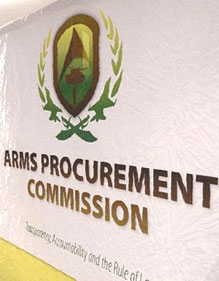|
Getting your Trinity Audio player ready...
|
 By Lee-Ann Alfreds
By Lee-Ann Alfreds
Will they or won’t they? That is the question as the rumbling around the credibility of the Arms Procurement Commission becomes a roar.
Will arms deal critics Hennie van Vuuren, Andrew Feinstein and Paul Holden appear before the commission as they have been ordered to do – or will they obey their conscience and refuse to appear before an inquiry they have accused of being “so deeply compromised that its primary outcome will be to cover-up the facts”?
The impasse has arisen because the commission served a subpoena on Van Vuuren on 15 September, ordering him to appear before the commission on 20 October … or face criminal action.
The commission indicated at the same time that it intended to subpoena Feinstein and Holden as well. This was however taking longer as they live in London, according to the commission’s spokesman William Baloyi.
Concerned about effectiveness of the commission
Van Vuuren, Feinstein and Holden – who have written books detailing the corruption and fraud in the arms deal – announced on August 28 that they were withdrawing their participation because of “serious and fatal concerns we have regarding the manner in which the commission has conducted itself”.
They said their decision was based on four key reasons namely that:
- Judge Willie Seriti had indicated that he was not interested in hearing evidence from other critics about documents that they had not themselves written, or about corruption allegations of which they had no personal knowledge. They pointed out that this was “particularly disturbing” as this limitation was not applied to previous witnesses who were supportive of the arms deal.
- The commission had consistently failed to provide them with access to relevant documents, which breached their legal rights.
- The commission had refused to admit key documents such as the draft auditor-general’s report (which provides evidence of severe irregularities in the selection process) and the Debevoise & Plimpton report (that provides evidence of actionable allegations of potential corruption).
- Information from staff who have resigned, and the commission’s own public conduct, suggests that it does not intend to properly investigate the deal.
Van Vuuren told Corruption Watch last week that he was “puzzled” by the decision to subpoena him.
“It seems unclear to me why we are being subpoenaed given that the commission, through its conduct, has made it clear that it favours a process that will treat us unfairly. The rulings made by the commission explicitly prevent witnesses such as ourselves from relying on documents that we have not authored. It means only those that have benefitted from corruption and the middlemen can produce such evidence.
“We have also not been allowed to access information which was within our rights, with no satisfactory explanation why this cannot happen. Following our decision to withdraw the commission released a statement on 28 August in which it stated, “… these witnesses do not have evidence to put before it…”. What then is the motive for calling us?” he questioned.
Van Vuuren said he had not yet decided whether to appear as instructed. “Andrew, Paul, and I are consulting with our legal team and have not yet made a decision on how to respond,” he said. “Our position has not changed – that the commission must be disbanded and replaced with an independent investigation that leads to the criminal prosecution of those implicated in wrongdoing such as corruption.”
Feinstein, who is in the US, confirmed he had not been served. “If I am I will discuss it with our legal team – which remains the same – before deciding what to do,” he said.
Assertions are baseless, malicious
Responding to questions from the Mail & Guardian about the summonses, Baloyi said, “Mr Van Vuuren is amongst the people who are believed to possess important information concerning wrongdoing in the arms procurement. It will be remiss of the commission not to call him. Otherwise the regulations are clear about what should happen if a witness refuses to testify.”
In terms of the disquiet about the way the commission was being run, Baloyi dismissed the claims.
“The commission cannot be shut down simply because a few individuals are unhappy with it. It should be noted that the commission has already heard evidence running into thousands of typed pages and very important evidence is still to be heard from important witnesses including investigators and implicated people. The baseless, malicious assertions that the commission will be a cover-up and that it has lost credibility will not deter us from executing our mandate,” he said.
The public hearings are to resume on 6 October, when Terry Crawford-Browne – whose legal action resulted in the institution of the commission – takes the stand.





